四川省宜宾六中高二英语课件:必修五Module 1 British and American English(共24张PPT)(外研版)
文档属性
| 名称 | 四川省宜宾六中高二英语课件:必修五Module 1 British and American English(共24张PPT)(外研版) | 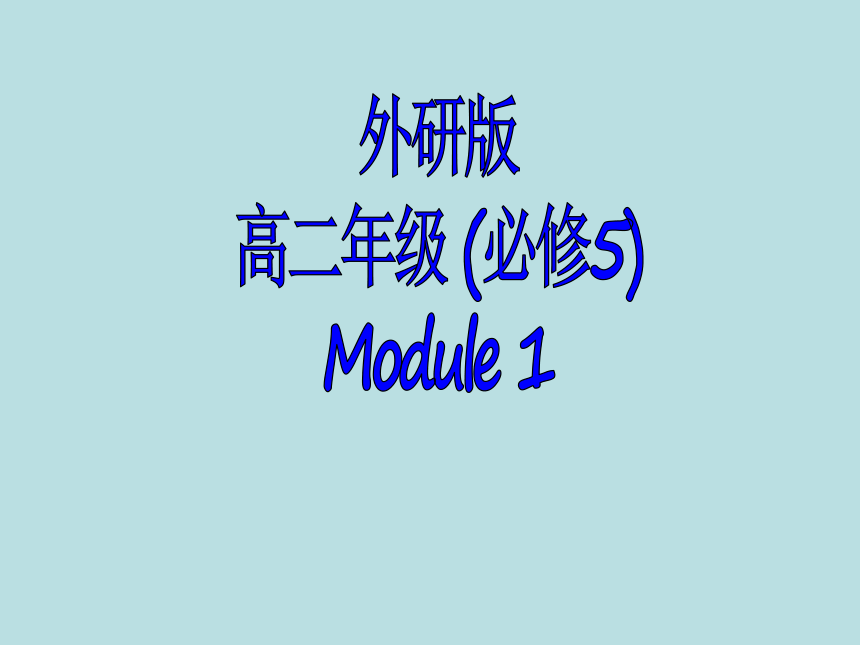 | |
| 格式 | zip | ||
| 文件大小 | 612.2KB | ||
| 资源类型 | 教案 | ||
| 版本资源 | 外研版 | ||
| 科目 | 英语 | ||
| 更新时间 | 2012-12-06 21:36:14 | ||
图片预览




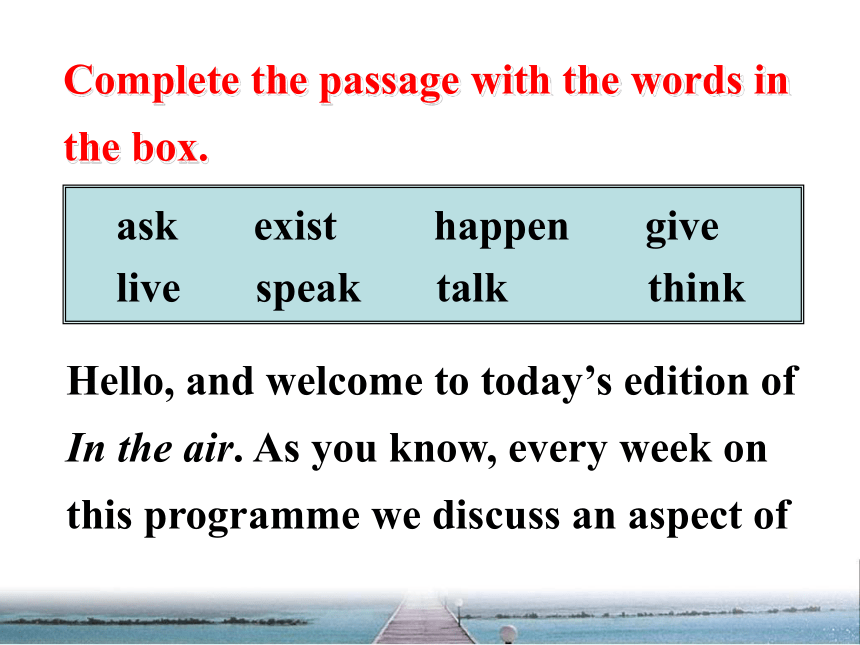
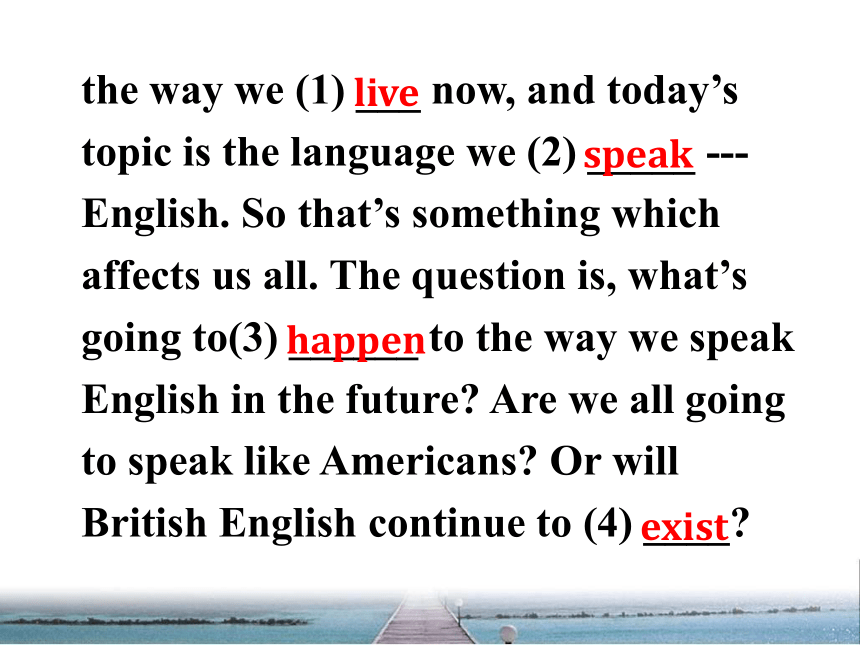
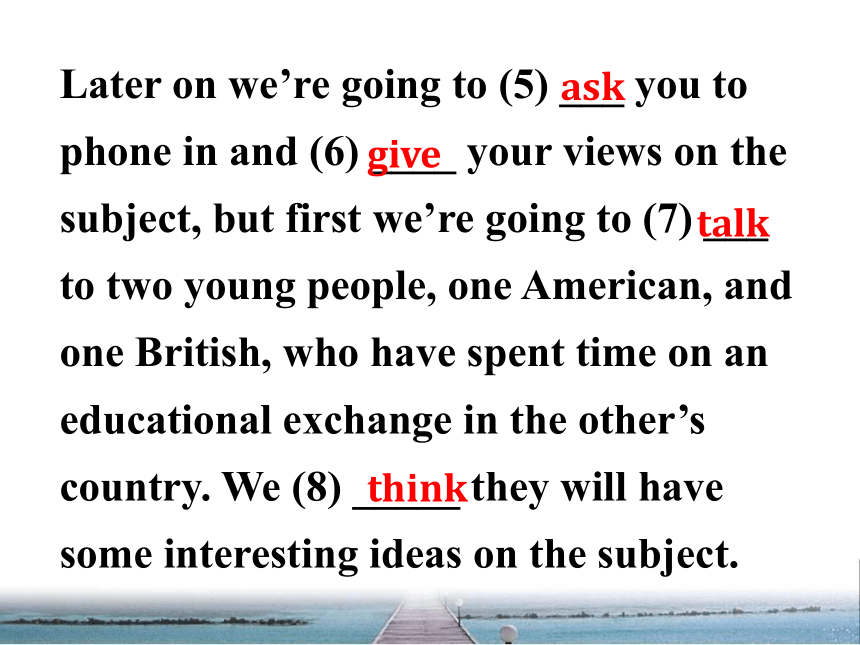
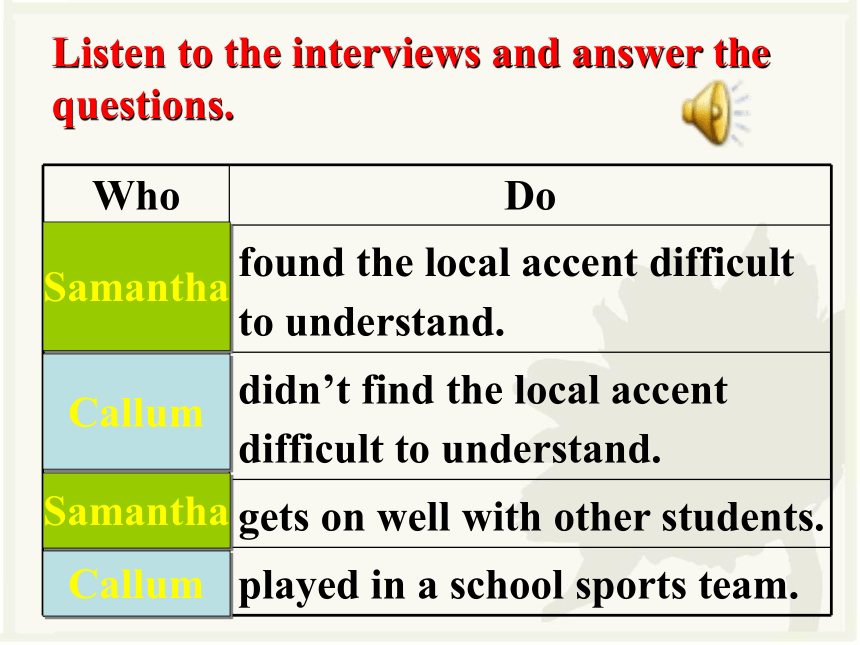
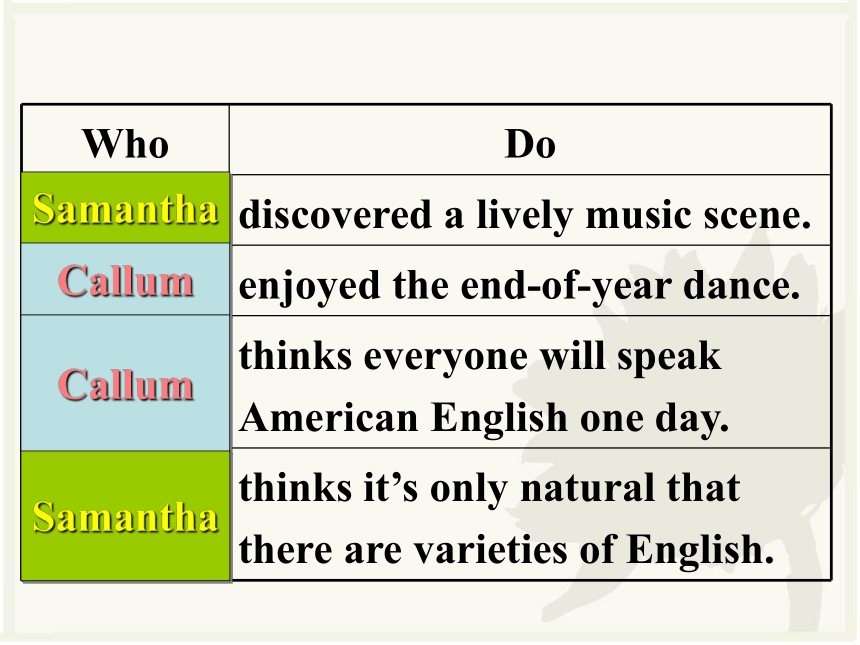
文档简介
(共24张PPT)
Vocabulary
&
Listening
&
Everyday English
exchange students
Think about problems exchange students have. Number them in order of importance.
1
2
4
3
5
6
a. understanding the language
b. getting on with people
c. food
d. different school subject and timetable
e. local customs
f. climate
Complete the passage with the words in the box.
Hello, and welcome to today’s edition of In the air. As you know, every week on this programme we discuss an aspect of
ask exist happen give
live speak talk think
the way we (1) ___ now, and today’s topic is the language we (2) _____ ---English. So that’s something which affects us all. The question is, what’s going to(3) ______ to the way we speak English in the future Are we all going to speak like Americans Or will British English continue to (4) ____
live
speak
happen
exist
Later on we’re going to (5) ___ you to phone in and (6) ____ your views on the subject, but first we’re going to (7) ___ to two young people, one American, and one British, who have spent time on an educational exchange in the other’s country. We (8) _____ they will have some interesting ideas on the subject.
ask
give
talk
think
Who Do
found the local accent difficult to understand.
didn’t find the local accent difficult to understand.
gets on well with other students.
played in a school sports team.
Samantha
Callum
Samantha
Callum
Listen to the interviews and answer the questions.
Who Do
discovered a lively music scene.
enjoyed the end-of-year dance.
thinks everyone will speak American English one day.
thinks it’s only natural that there are varieties of English.
Samantha
Callum
Callum
Samantha
Listen again and answer the questions.
Which part of the country is Samantha staying in
The north of England (Leeds in Yorkshire).
2. How long did it take her to understand what people were saying
Two months.
3. What did she notice about the pronunciation of words like dance and bath
They’re the same as in American English.
4. What is the last question the interviewer asked Samantha
Do you think you’ll go home speaking with a north of England accent
5. How long did Callum spend in the US
Ten months.
6. What didn’t he like about the place he stayed in
The climate (hot and humid).
7. What did he say about the way people spoke
It was easy to understand; they spoke rather slowly.
8. What did girls like about Callum
His English accent (it was cute).
Everyday English
Complete the sentences with the correct phrases.
How are you getting on is a question about___. A. Samantha’s health B. what Samantha is doing
2. I didn’t get what people were saying means____. A. I didn’t understand it B. I didn’t like it
3. When Samantha got used to the accent she____. A. began to understand it B. used it when she spoke English
4. So far means _____. A. for a long time B. until now
5. That’s a good point means____. A. what you say is interesting B. I agree with you
6. The girls in Callum’s school made a fuss of him by__. A. laughing at him B. showing a lot of interest in him
7. A cute accent is ____. A. horrible B. attractive
8. A couple of means ____. A. two B. two or three
9. If Callum picked up the local accent he ____. A. started to use it B. wasn’t able to use it
10. If Callum’s American accent has worn off, it has___.
A. disappeared B. become very noticeable
1. point
1) 要点; 中心思想
He missed the whole point of my speech.
他没弄明白我整个演说的要点。
2) 意义;目的;用途un. (+in/of)
There is no point in complaining.
抱怨没有任何意义。
重点单词或短语讲解:
2.1) wear off 慢慢消失
My first impressions of the city were
wearing off.
The pain in his back is wearing off.
2) wear out 使疲惫不堪
He was worn out by the hard work.
繁重的工作使他疲惫不堪。
The long wait wore everyone out.
3. pick up
举起或抬起某人[某物]; 拿起; 拾起:
He picked up the book from the floor.
他从地板上把书拾起来.
(b) 见到, 听到(尤指藉助仪器):
The equipment picked up the signal
from the satellite.
这设备收到了卫星发出的信号。
(c) 通过实践学会(外语、 技术等):
She soon picked up French when she
went to live in France.
她到法国居住后很快就学会了法语。
(d) 得, 染(疾病):
pick up an infection, a cold, the flu,
(e) 买到某物(尤指价廉或运气好):
She picked up a valuable first edition at a village book sale.
她在乡村图书展销会上买到一本珍贵的首版书。
Vocabulary
&
Listening
&
Everyday English
exchange students
Think about problems exchange students have. Number them in order of importance.
1
2
4
3
5
6
a. understanding the language
b. getting on with people
c. food
d. different school subject and timetable
e. local customs
f. climate
Complete the passage with the words in the box.
Hello, and welcome to today’s edition of In the air. As you know, every week on this programme we discuss an aspect of
ask exist happen give
live speak talk think
the way we (1) ___ now, and today’s topic is the language we (2) _____ ---English. So that’s something which affects us all. The question is, what’s going to(3) ______ to the way we speak English in the future Are we all going to speak like Americans Or will British English continue to (4) ____
live
speak
happen
exist
Later on we’re going to (5) ___ you to phone in and (6) ____ your views on the subject, but first we’re going to (7) ___ to two young people, one American, and one British, who have spent time on an educational exchange in the other’s country. We (8) _____ they will have some interesting ideas on the subject.
ask
give
talk
think
Who Do
found the local accent difficult to understand.
didn’t find the local accent difficult to understand.
gets on well with other students.
played in a school sports team.
Samantha
Callum
Samantha
Callum
Listen to the interviews and answer the questions.
Who Do
discovered a lively music scene.
enjoyed the end-of-year dance.
thinks everyone will speak American English one day.
thinks it’s only natural that there are varieties of English.
Samantha
Callum
Callum
Samantha
Listen again and answer the questions.
Which part of the country is Samantha staying in
The north of England (Leeds in Yorkshire).
2. How long did it take her to understand what people were saying
Two months.
3. What did she notice about the pronunciation of words like dance and bath
They’re the same as in American English.
4. What is the last question the interviewer asked Samantha
Do you think you’ll go home speaking with a north of England accent
5. How long did Callum spend in the US
Ten months.
6. What didn’t he like about the place he stayed in
The climate (hot and humid).
7. What did he say about the way people spoke
It was easy to understand; they spoke rather slowly.
8. What did girls like about Callum
His English accent (it was cute).
Everyday English
Complete the sentences with the correct phrases.
How are you getting on is a question about___. A. Samantha’s health B. what Samantha is doing
2. I didn’t get what people were saying means____. A. I didn’t understand it B. I didn’t like it
3. When Samantha got used to the accent she____. A. began to understand it B. used it when she spoke English
4. So far means _____. A. for a long time B. until now
5. That’s a good point means____. A. what you say is interesting B. I agree with you
6. The girls in Callum’s school made a fuss of him by__. A. laughing at him B. showing a lot of interest in him
7. A cute accent is ____. A. horrible B. attractive
8. A couple of means ____. A. two B. two or three
9. If Callum picked up the local accent he ____. A. started to use it B. wasn’t able to use it
10. If Callum’s American accent has worn off, it has___.
A. disappeared B. become very noticeable
1. point
1) 要点; 中心思想
He missed the whole point of my speech.
他没弄明白我整个演说的要点。
2) 意义;目的;用途un. (+in/of)
There is no point in complaining.
抱怨没有任何意义。
重点单词或短语讲解:
2.1) wear off 慢慢消失
My first impressions of the city were
wearing off.
The pain in his back is wearing off.
2) wear out 使疲惫不堪
He was worn out by the hard work.
繁重的工作使他疲惫不堪。
The long wait wore everyone out.
3. pick up
举起或抬起某人[某物]; 拿起; 拾起:
He picked up the book from the floor.
他从地板上把书拾起来.
(b) 见到, 听到(尤指藉助仪器):
The equipment picked up the signal
from the satellite.
这设备收到了卫星发出的信号。
(c) 通过实践学会(外语、 技术等):
She soon picked up French when she
went to live in France.
她到法国居住后很快就学会了法语。
(d) 得, 染(疾病):
pick up an infection, a cold, the flu,
(e) 买到某物(尤指价廉或运气好):
She picked up a valuable first edition at a village book sale.
她在乡村图书展销会上买到一本珍贵的首版书。
